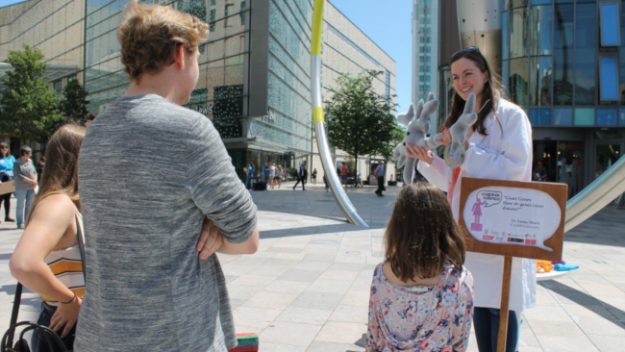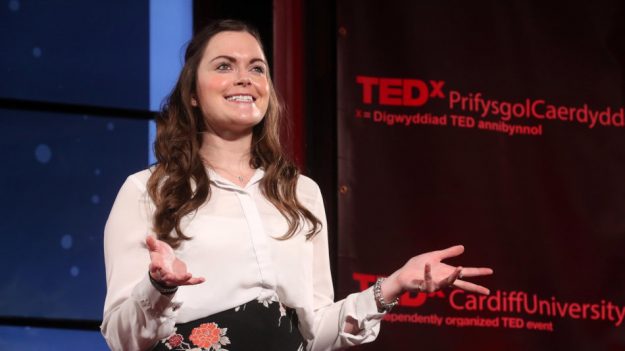Breaking down the barriers between scientists and the public and encouraging the public and politicians to engage with science. Emma is proving that scientists are more than just boring people in lab coats.
Speaking to Emma, in the modern Cardiff University Haydn Ellis Building, you would hardly believe it was a building full of scientists doing cutting edge research. It did not look like what science laboratories look like on TV or films, the only hint of science came from a few paintings of blue and purple brains on the wall.
“I had really good school teachers who were very supportive in me perusing science as a career as it was something I enjoyed. It was probably that experience that made me decide to do the degree at university.”, she studied Biochemistry in Cardiff before moving to neuroscience research PhD, Emma says “I enjoy answering questions that nobody else knows the answers to. That’s part of academic research, is asking new questions which we don’t know what the results will be, which is quite exciting.”
She now specialises in brain diseases, especially Huntington’s disease “Brain diseases in general we know are affecting more and more people due to the ageing population we are seeing more diseases of ageing such as dementia and Alzheimer’s disease. Specifically, in relation to Huntington’s Disease we know that often this is a disease that has a lot of stigma associated with it. Brain diseases are getting more common unfortunately, and if we got more people to understand the importance of looking after people affected by them, and research so we can help those people, is really important.”

Her interest in speaking to the public about science started in 2012 working as a STEM ambassador “The initial drive was to go to schools and talk to children about what it’s like to be a scientist. When I was at school, I didn’t know what a scientist did or what a career is science would be like.” Scientists are usually seen as old men in white lab-coats “Someone said to me the work that I do myself is good as acting as a role model as people say ‘you can’t be what you can’t see’”
“I think we need to be doing more to talk to people in ways that people understand but are also entertaining and amusing because when you do that people don’t necessarily think they’re learning” Talking about her style of public engagement that includes making jeans/genes puns and making a human strand of DNA out of members of her audience “There’s nothing worse than dry academic talk, because that is actually quite detrimental to public engagement… It’s great to do something quite different that makes it stand out a bit more and that is entertaining but hopefully based in facts and knowledge so that people genuinely learn something from it as well”
In the last year Emma has taken part in many public engagement events and talks such as the British Science Festival Lectures, Hay Festival, Soapbox Science and the TedX Cardiff University talks. When discussing her favourite event, she says, “Probably TedX Cardiff University talk last year, which was nice because it was a little bit less about my specific research and more about my family history, lived experiences with dementia and Alzheimer’s disease, on a more personal level it was nice to talk about that as well.”
However, not all scientists and researchers are involved in public engagement, it is often overlooked by researchers or establishments as a whole “I think it’s really challenging for the scientific community, we are being pulled in different directions, we have to measure the impact of our research, we have to get 5-star impact research papers out, and do teaching. All these are really important different academic areas all need to be done, I think there needs to be more incentives to do public engagement.”
As science is largely funded through tax payers, and many decisions about science have real world connotations, makes public engagement of science an important job “I think the emphasis should be on the scientific community but there should be a need for the public to ask us more questions, for us to be more open and inclusive and accountable to the public for the research we are doing. I think we can do more as scientists to break down those barriers and encourage people to ask questions of us, and that can be done in a nice polite way”

As well as her work with the public, she has also worked with MPs and the government, she explains why this is so important “the laws that govern the country are the ultimate in terms of law and how we do things properly. Given the interesting political times we are living in, having an impact there is really important when you think about how science is funded, how different disease areas are funded, and the future of science really.” Very few MPs have a scientific background, and even less have done scientific research “Engaging with policy makers is important and a two-way street, so that when policies are designed, they come to us as experts in the field so that their policies are well informed because they need to be really if they are governing the laws of the country”
